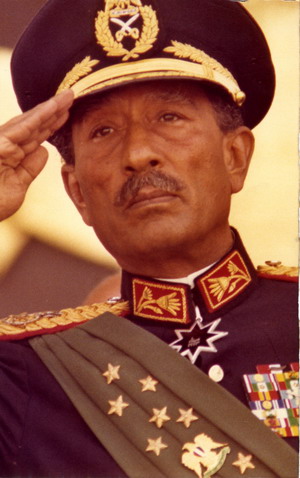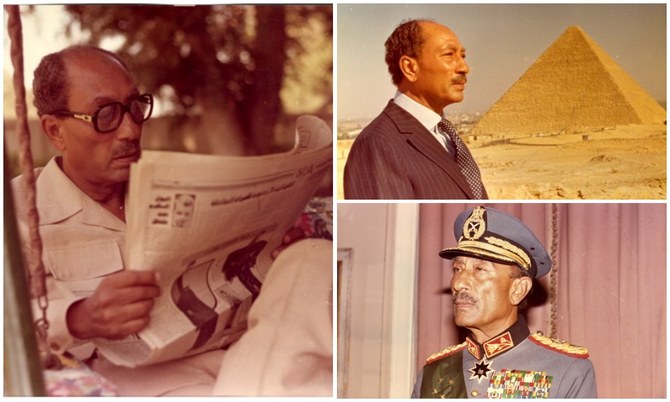LONDON: In the winter of 1973, Anwar Sadat was enjoying his time in the sun. He was “batal al-ubur” – the “Hero of the Crossing.” The 1973 war against Israel was a huge propaganda success, never mind that the reality was very different from how the Egyptian media portrayed it.
After years of planning, the Egyptian army had successfully crossed the Suez Canal, catching the Israeli army unawares. National pride had been restored and the Egyptian public had bestowed a new title on Sadat.
But at home, Sadat’s problem was the state of the economy. The expectations of the Egyptian public were high following the military victory; confrontation with Israel could no longer be used as an excuse for every privation they suffered.
Defeat in the 1967 war six years previously had near-bankrupted Egypt and seriously harmed industry. Both inflation and foreign debt were high.
Over the course of his 14 years in power, Sadat’s predecessor Gamal Abdel Nasser had courted and won the support of the Soviet Union.
Together, Nasser and the Russians had built the second Aswan dam, a project designed to launch Egypt on the twin tracks of industrial and agricultural development.
The ambitions had not been fully realized. The early years of the dam project were hit with teething problems. Land downstream from the dam was affected by increased salinity and waterlogging.

Defeat in the 1967 war six years previously had near-bankrupted Egypt and seriously harmed industry. Both inflation and foreign debt were high. (AFP/File Photo)
As Sadat took power following Nasser’s death in 1970, the economy was still run according to the dictates of central planners.
Prices for essential commodities were controlled and investment in projects was centrally dictated, leading to widespread shortages and wastage.
Egypt’s youthful population stood at 34.5 million, with rates of growth in the order of 2.5 percent.
The economy was hampered by low levels of productivity, an absence of relevant education and a consequent lack of skilled workers. Farmers were told what to plant. In today’s terminology, price indicators were not effective.
Other problems persisted. One of Nasser’s legacies was the creation of a huge public sector and an overregulated state economy, emulating the Soviet Union.
He had opened up higher education to all and guaranteed a job to every graduate with little heed paid to quality or relevance of training.
College graduates flocked into ministries, municipalities and into state-controlled companies where security of tenure was guaranteed. The result was low levels of productivity coupled with a tendency to obstruct innovation and entrepreneurship.
Nasser had also orchestrated the emigration of large communities of Italian and Greek craftsmen, artisans and small-scale businessmen, the so-called mutamasriyun.
While reforms in the 1950s had broken the power of the big landlords, these more minor actors had been alienated by the state seizing their property.
Between 1962 and 1964, for example, all foreign-owned land had been expropriated. The Jewish community had also all but fled the country in the 1950s.
INNUMBERS
* $3bn - Excess of Egyptian food imports over exports in 1981.
* 90% - Foreign capital’s share of financing of public projects.
The result of the exodus was a collapse in municipal and other services and an absence of skilled workers in the public sector and in utilities like electricity supply.
Sadat had never been afraid of a challenge and was fond of the dramatic gesture. He had worked as a spy for the Germans in the Second World War against the British and then served as Nasser’s deputy. He moved decisively to break with his predecessor by reopening Egypt up to foreign investment.
This was the infitah — or opening — also known as the Open Door Economic Policy. It was a collection of liberalization measures linked to a degree of political easing.
The policy involved a rejection of the close ties with the Soviet Union, building closer relations with the US and Arab Gulf states, and the distancing of the military from the economy.
Following Nasser’s death, Sadat had prefigured the reforms with a Plan for National Action in 1971 and, in 1972, had expelled thousands of Soviet military advisers.
In 1974, he promulgated a new investment regulation titled Law 43. Tariffs were lowered and foreign banks were encouraged to return to the country. Sadat reversed some of the confiscations of private property.
The new law’s main aim was to attract Arab and foreign investment capital. To that end, it created a new organization, the General Authority for Investment and Free Zones, under the auspices of the Ministry of Economy.
According to “The Experience of Foreign Investment Under Infitah,” by Hadi Salehi Esfahani, the law provided incentives and included a promise to refrain from nationalization and the confiscation of invested capital except by judicial procedures. It exempted investors from a number of labor regulations; it gave a five- to eight-year exemption from taxes on profits; allowed for a deferment on the payments of customs duties, and gave permission to import without a license.

In the winter of 1973, Anwar Sadat was enjoying his time in the sun. He was “batal al-ubur” – the “Hero of the Crossing.” (Supplied)
The results were patchy but the trajectory for the Egyptian economy was upward. According to “Egypt’s Development In the 1970s,” by Henry Bruton, private investment under Law 43 was slow at the start, and did not reach 100 million Egyptian pounds ($6.6 million) until 1979. Investment was heavily concentrated in sectors such as banks, consulting offices, fast-food shops and construction.
However, GDP growth rates rose to 8 to 10 percent per annum through the 1970s and the balance of payments moved favorably. Yields of cotton and rice increased significantly.
Toward the end of the decade, Egypt was massively helped by a relatively sudden infusion of foreign exchange as large deposits of oil and gas came on stream and were monetized.
The economy was also supported by increased aid money from the US, Suez Canal revenues and the beginning of Egypt’s tourism industry. The canal had been closed in 1967 but Sadat reopened it in 1975. Revenues from ships passing through the canal began to flow to the Egyptian state.
The Gulf states also opened to Egyptian labor as their oil and gas reserves flowed. This proved to be something of a double-edged sword for Sadat.
Many skilled and educated Egyptians chose to migrate, to take advantage of the higher wages on offer in the Gulf states and elsewhere. On the brighter side, the workers began to send back remittances — as they do to this day.
Remittances grew from nothing in 1971 to over $2.2 billion in 1979, according to official numbers, but were probably higher if informal transfers are included.

When Sadat took power following Nasser's death, the economy was still run according to the dictates of central planners - prices and investments were strictly controlled. (Supplied)
The combination of workers’ remittances, oil and gas revenues, earnings from the Suez Canal, and tourism receipts propelled foreign exchange reserves to $2.5 billion in 1980 from less than $0.5 billion in 1972.
But the budget deficit swelled, inflation spiked, imports rose dramatically and income disparities grew. Defense spending remained a heavy burden.
In 1977, the Central Bank started printing 20-pound notes. In 1979, the pound was devalued and subsequently lost almost half its value, for the first time falling below parity with the pound sterling.
Moreover, the World Bank and International Monetary Fund were prescribing an end to subsidies on basic foodstuffs which was a major cause of the persistent budget deficits.
In 1977, Sadat announced price hikes for flour, rice and cooking oil at the behest of the World Bank. This provoked massive riots by poor Egyptians.
Most major Egyptian towns and cities were hit by violence. More than 70 people died. The fear of provoking similar levels of rioting has gripped the Egyptian ruling classes ever since.




























